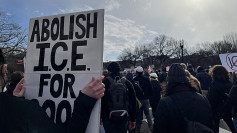The United States faces a potential financial shock as the Supreme Court weighs the legality of President Donald Trump's expansive emergency tariffs, a ruling that could force the government to refund as much as £760 billion ($1 trillion) in duties collected from American importers. The case, rooted in Trump's use of the International Emergency Economic Powers Act, now threatens to reshape U.S. trade policy and expose the federal government to one of the largest forced repayments in modern history.
Treasury Secretary Scott Bessent warned the Court that the risks grow monthly, telling justices that the longer the Court waits to issue a decision, the larger the potential repayment burden becomes, according to CNBC. Tens of billions of pounds have already been added this year as Trump continues to rely on emergency authority to impose fast-moving tariff changes.
At the heart of the case is whether a ruling against the administration would obligate the government to reimburse all importers, or only the companies directly involved in the lawsuit. Former Acting Solicitor General Neal Katyal argued that only plaintiffs would automatically receive refunds and that other companies would be forced into a multi-step legal process to recover their money. Justice Amy Coney Barrett reacted sharply to the scenario, calling it "a mess."
Trade attorneys describe a future racked with administrative strain. Many of Trump's tariffs changed repeatedly, sometimes multiple times in a single year, creating shipments containing goods subject to different rates. Joyce Adetutu, a partner at Vinson & Elkins, told CNBC that untangling the customs history "is going to take quite a bit of time" and will create "an administrative burden" for both regulators and private companies.
Businesses, sensing the stakes, are moving aggressively. Importers nationwide are filing protective protests with U.S. Customs and Border Protection to preserve refund rights should the Court overturn the tariffs. Others are conducting hurried internal audits to account for years of tariff exposure. Some small firms say the financial toll has already been severe. Rick Muskat, CEO of footwear company DeerStags, told CNBC that his business has paid more than £760,000 ($1 million) in tariff charges and argued that companies should be able to seek refunds based on itemized customs paperwork.
A ruling against the administration could create an unprecedented fiscal liability. Bessent estimated that repayments could reach £570.8 billion to £760 billion ($750 billion to $1 trillion) if the Court invalidates the emergency tariffs and retroactively orders refunds. The sheer magnitude would represent one of the largest revenue reversals in U.S. history, raising questions about budgetary stability and the federal government's ability to process claims quickly.
President Trump has defended the tariffs as critical tools of national security and leverage in trade negotiations. He has argued that reversing them "would literally destroy the United States of America," a warning directed at both Congress and the courts as criticism of IEEPA authority intensifies.
Opponents counter that the administration bypassed Congress' constitutional authority over taxation and set a dangerous precedent by stretching emergency powers beyond their intended scope. Lawmakers and trade groups say that if the justices side with the challengers, hundreds of thousands of importers may rush to file refund claims before administrative windows close.






